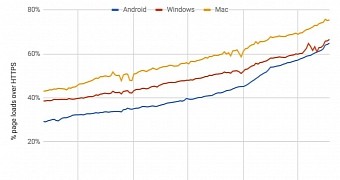Google announced last year that Chrome browser would start flagging websites not using HTTPS to send sensitive user details like passwords or credit card data as “not secure” as soon as they were loaded, and the company now comes back to explain that this aggressive strategy is paying off.
The search giant explained in an announcement today that adoption of HTTPS is growing at a fast pace across the world, with no less than 64 percent of the Android traffic now secure, versus 42 percent last year. Google says figures have improved on Mac as well from 60 percent last year to 75 percent in 2018, while on Windows HTTPS adoption increased from 51 percent to 66 percent.
The company went on to reveal that out of top 100 websites right now, 71 of them are currently using HTTPS by default, and this is an increase from 37 percent last year.
Mobile devices accounting for most unencrypted traffic
Google says no less than 95.1 percent of the unencrypted traffic takes place on mobile, especially because there are lots of devices on the market that run old software without support for HTTPS.
“Mobile devices account for the vast majority of unencrypted end user traffic that originates from a given set of surveyed Google services. Some older devices cannot support modern encryption, standards, or protocols. Unfortunately, these devices may no longer support software updates and, as a result, may never support encryption,” the firm says.
On the other hand, there are signs that adoption of HTTPS is improving all over the world, and this could spearhead the transition to this secure protocol on mobile as well.
In the United States alone, no less than 73 percent of the Google Chrome traffic is secure now, up from 59 percent, while in Japan and Brazil, HTTPS adoption reached 55 percent and 66 percent, respectively.
While this data shows that Google’s strategy is effective, the search firm is just one of the big companies pushing for HTTPS adoption, with Apple and Facebook also leading and encouraging the transition off HTTP.
Full numbers can be found in the company's transparency report here.

 14 DAY TRIAL //
14 DAY TRIAL //